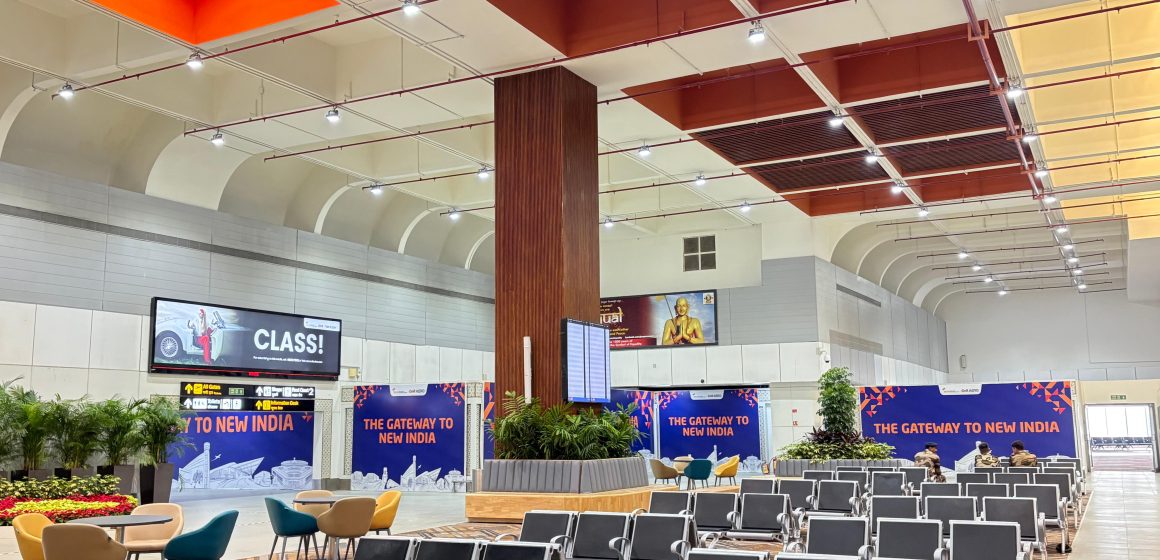The upgraded Terminal 2 at India’s busiest airport combines advanced systems with smart infrastructure to streamline passenger movement and rebalance airline operations.
Delhi International Airport Limited (DIAL), led by the GMR Group, has announced the reopening of the upgraded Terminal 2 (T2) at Indira Gandhi International Airport (IGIA), effective from the intervening night of October 25-26. The relaunch coincides with the start of the winter schedule and marks a significant milestone in what is also the country’s busiest airport’s infrastructure modernisation drive.
Kinjarapu Rammohan Naidu, Union Minister for Civil Aviation, inaugurated the refurbished terminal on Saturday morning. Speaking at the event, Naidu said, “Handling nearly 50 per cent of the northern region’s total passenger traffic and managing nearly 50,000 transfers every day, Delhi is emerging as a preferred transfer hub. And I believe this has been possible only because of DIAL’s continuous push for upgrading the infrastructure and enhancing passenger throughput.”
He added, “Now the 40-year-old legacy Terminal 2 of Delhi has been reimagined and revitalised to serve the modern aspirations and growing demand. Every traveller passing through here will experience the essence of a connected, competitive, and caring India.”
Senior officials from the Ministry of Civil Aviation, Airports Authority of India, Central Industrial Security Force, and DIAL were in attendance at the ceremony.
Advanced Systems, Smart Infrastructure
The upgraded T2 integrates advanced systems and smart infrastructure to streamline passenger movement and optimise airline operations. A key feature is the introduction of self-baggage drop (SBD) counters, enabling passengers to check in their luggage independently and reduce queue times. Six new passenger boarding bridges (PBBs) have been installed, offering safer and more accessible aircraft handling. These bridges feature swing doors and padded side cushions for improved safety and aesthetics.
Passengers will also benefit from a virtual information desk that consolidates flight updates, gate navigation, airport services, and Wi-Fi access into a single interactive platform. The terminal’s interiors have been redesigned with skylights, modern ceilings, upgraded flooring, and intuitive signage to enhance comfort and wayfinding. Facilities for persons with reduced mobility (PRM) have been prioritised to ensure inclusive access.
On the operational front, T2 has undergone comprehensive mechanical and electrical upgrades, including advanced heating, ventilation, and air conditioning (HVAC) systems for better air quality and modern fire safety installations. The airside and apron areas have been refurbished to support efficient aircraft movement and future traffic growth. A high-resolution flight information display system (FIDS) complements the terminal’s navigation infrastructure.
Flight Redistribution
With the reopening of T2, airline operations at IGI Airport will be redistributed to improve terminal efficiency. IndiGo will operate flights across all three terminals, with services numbered 6E 2000-2999 shifting to T2.
Air India will move approximately 60 domestic flights from Terminal 3 to Terminal 2, while Air India Express, SpiceJet, and Akasa Air will continue domestic operations from Terminal 1. Together, Air India and IndiGo will operate around 120 daily domestic flights from the upgraded T2.
Commenting on the development, Videh Kumar Jaipuriar, CEO of DIAL, said, “Designed as a future-ready, passenger-friendly terminal, T2 integrates modern technology, smart infrastructure, and improved accessibility to deliver a seamless travel experience. This reopening also allows for more balanced airline operations across terminals, further enhancing efficiency and convenience for millions of travellers.”


